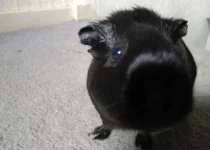Why does my dog keep farting and it stinks?
Why does my dog keep farting and it stinks?
Is your dog constantly farting and leaving behind a stinky trail? While it may seem like a funny or annoying issue, frequent dog flatulence can sometimes signal underlying health concerns.
Dogs, like humans, can experience digestive issues that lead to excess gas production, often resulting in unpleasant odors.
The causes of excessive farting can range from dietary choices, food allergies, and food intolerances, to gastrointestinal problems such as bloating or infections.
Understanding why your dog is farting can help you address the root cause and provide relief, ensuring both your dog and your nose stay happy!
Here can you get pink from farting on a pillow?
Why does my dog fart and smell so much?
Why does my dog keep farting and it stinks?
If your dog is farting excessively and the smell is overpowering, it could be due to several factors. One common cause is diet.

Dogs with poor digestion or those consuming food that’s hard to process can produce more gas. Ingredients like soy, beans, or dairy may lead to gas and bloating, especially if your dog has food sensitivities or intolerances.
Additionally, swallowing air while eating or drinking too quickly can contribute to excess gas.
Gastrointestinal issues, such as infections, parasites, or imbalances in gut bacteria, can also lead to smelly farts.
Some dogs may suffer from inflammatory bowel disease (IBD) or other digestive disorders, which can result in more frequent and foul-smelling gas.
Lastly, obesity can affect digestion, causing gas buildup. If your dog’s flatulence is persistent or accompanied by other symptoms like diarrhea, vomiting, or discomfort, a visit to the vet is recommended to rule out underlying health issues.
Should I be worried if my dog has bad gas?
Why does my dog keep farting and it stinks?
Occasional bad gas in dogs is generally not a cause for concern, as it can happen due to dietary changes, eating too quickly, or a temporary digestive upset.
However, if your dog frequently experiences foul-smelling gas, especially accompanied by other symptoms like diarrhea, vomiting, lethargy, or loss of appetite, it may indicate a more serious issue.
Conditions such as food allergies, gastrointestinal infections, parasites, or inflammatory bowel disease (IBD) can cause persistent digestive problems and excessive gas.
If the bad gas is accompanied by bloating, discomfort, or changes in your dog’s behavior, it’s important to consult a veterinarian.
They can determine if there is an underlying health problem and recommend the appropriate treatment or dietary changes.
In some cases, a simple food adjustment may help, but persistent symptoms should always be evaluated to ensure your dog’s health and well-being.
What can you give a dog for smelly gas?
Why does my dog keep farting and it stinks?
If your dog is suffering from smelly gas, there are several potential remedies and adjustments you can try. First, evaluate your dog’s diet.
Here, does rabbits fart?
Switching to a high-quality food with easily digestible ingredients may help reduce gas. Look for foods that don’t contain fillers like soy, corn, or wheat, which can cause digestive issues.
Adding probiotics to your dog’s diet can improve gut health and reduce gas by balancing the intestinal bacteria. You can find probiotics specifically designed for dogs in pet stores or vet clinics.
Some dogs also benefit from digestive enzymes, which can help break down food more efficiently.
If your dog is prone to eating too quickly, try a slow feeder bowl to reduce the amount of air swallowed.
Avoid feeding your dog human foods or treats that can cause gas, such as dairy, beans, or fatty foods.
If gas persists or worsens, it’s best to consult a veterinarian to rule out underlying health issues.
What does an unhealthy fart smell like?
Why does my dog keep farting and it stinks?
An unhealthy fart typically has a much stronger, more unpleasant odor compared to normal gas. While regular gas may smell mildly unpleasant or neutral, unhealthy flatulence tends to be excessively foul, often described as rancid, sour, or sulfuric.

This can occur when there is an imbalance in your dog’s digestive system, such as an issue with gut bacteria or a gastrointestinal problem.
For example, gas that smells like rotten eggs is often associated with a higher concentration of sulfur compounds, which can result from poor digestion of proteins or an intestinal infection.
Foul-smelling gas can also be a sign of food intolerances or allergies, where undigested food ferments in the gut, producing strong odors.
If the smell persists or is accompanied by other symptoms like diarrhea, vomiting, or lethargy, it may indicate an underlying health issue that requires veterinary attention. It’s always best to address persistent changes in your dog’s digestion.
Why does my dog keep farting and it stinks?
Why does my dog keep farting and it stinks?
If your dog keeps farting and the smell is overwhelming, several factors could be at play. One of the most common causes is diet.
Here, can a fish fart?
Dogs that consume foods high in fiber, beans, or certain grains may produce more gas. Additionally, food allergies or sensitivities, particularly to dairy, soy, or certain proteins, can lead to excessive farting.
If your dog is eating too quickly, they might also swallow air, contributing to gas buildup in the digestive tract.
Gastrointestinal issues like infections, parasites, or imbalances in gut bacteria can also lead to smelly flatulence. Conditions such as inflammatory bowel disease (IBD) or food intolerances can cause the body to have difficulty digesting food, which results in excessive gas.
Obesity and a sedentary lifestyle can exacerbate digestive problems as well. If your dog’s flatulence is persistent, painful, or accompanied by other symptoms, a vet visit is recommended to rule out any serious health conditions.
9 Reasons why dog keep farting and it stinks
Why does my dog keep farting and it stinks?
1. Dietary Issues
A dog’s diet is one of the most common reasons for excessive gas and foul-smelling farts. Foods that are difficult to digest, such as those rich in fiber, beans, or certain grains, can cause the fermentation of undigested food in the intestines, leading to gas buildup.
Additionally, processed foods containing artificial preservatives, colors, and fillers may disrupt your dog’s digestion. Dogs with food allergies or intolerances, especially to ingredients like dairy, gluten, or soy, often produce more gas.
Feeding your dog high-quality, easily digestible food can help reduce this problem. If you notice a correlation between certain foods and your dog’s flatulence, consider switching their diet or consulting your vet for a recommendation.
2. Eating Too Quickly
When dogs eat too fast, they tend to swallow excess air, which can lead to gas in the stomach and intestines.
This swallowed air contributes to bloating and increases the amount of gas in your dog’s digestive system, resulting in frequent and smelly farts. Dogs who eat quickly may also overeat, which can put additional strain on their digestive systems, leading to further gas production.
To prevent this, try using slow-feed bowls or puzzle feeders to slow down your dog’s eating pace. These tools encourage your dog to eat more slowly, reducing the amount of air swallowed and helping to ease digestion.
3. Food Sensitivities and Intolerances
Why does my dog keep farting and it stinks?
Here, do frogs fart?
Just like humans, dogs can develop food sensitivities or intolerances that affect their digestion. Common culprits include dairy, wheat, soy, and certain proteins, like beef or chicken.
When a dog’s digestive system struggles to process these ingredients, the food may ferment in the intestines, causing an increase in gas production and unpleasant odors. In some cases, this can also lead to other gastrointestinal symptoms such as diarrhea or vomiting. Identifying the offending food and eliminating it from your dog’s diet is key.
Consult with your vet to determine which ingredients may be causing the problem and explore suitable hypoallergenic or grain-free food options.
4. Digestive Disorders
Certain digestive disorders, such as inflammatory bowel disease (IBD), can cause excessive and smelly gas in dogs. IBD is a chronic condition where the intestines become inflamed, often due to food sensitivities, infections, or imbalances in gut bacteria.
This inflammation can lead to improper digestion, causing food to ferment and produce an excessive amount of gas.
Other conditions like malabsorption, where the body cannot fully absorb nutrients, can also cause similar symptoms. If your dog’s flatulence is persistent or accompanied by diarrhea, vomiting, or weight loss, it’s important to visit your vet for a proper diagnosis and treatment plan.
5. Intestinal Infections
Intestinal infections caused by bacteria, viruses, or parasites can also lead to smelly gas in dogs.
These infections disrupt the normal balance of bacteria in the gut, causing digestion issues and excessive gas production. Infections like giardiasis or bacterial overgrowth can lead to foul-smelling flatulence, along with other symptoms like diarrhea, lethargy, and poor appetite.
If you suspect your dog has an intestinal infection, it’s important to consult with your vet, who may recommend fecal testing or prescribe antibiotics to treat the infection. Proper treatment should help restore your dog’s digestive health and reduce the odor.
6. Swallowing Air
Dogs that swallow air while eating, drinking, or panting can experience a buildup of gas in their digestive system. This can occur in dogs that eat too quickly, drink large amounts of water in one sitting, or have anxiety that causes excessive panting.
This swallowed air enters the stomach and intestines, leading to bloating, discomfort, and increased flatulence.
Dogs with this behavior can develop more frequent and smelly gas as the air passes through the digestive tract. To alleviate this, consider slowing down your dog’s eating habits with special bowls, and reduce stress factors that may cause panting. Ensuring your dog drinks at a moderate pace can also help.
7. Obesity
Obesity can contribute to excessive farting and foul-smelling gas in dogs due to the strain it places on the digestive system. Overweight dogs often experience slower digestion, which can result in more fermentation of food in the intestines, leading to gas production. The extra weight can also cause gastrointestinal discomfort, including bloating and constipation, which exacerbate the issue.
Here, do frogs fart?
Additionally, obesity can alter the balance of gut bacteria, further contributing to digestive problems. If your dog is overweight, consult with your vet to develop a healthy eating plan and exercise routine to help manage their weight and improve their digestive health.
8. Change in Diet or Feeding Schedule
Why does my dog keep farting and it stinks?
Sudden changes in your dog’s diet or feeding schedule can disrupt their digestive system, leading to more frequent and smelly farts. When you switch your dog’s food abruptly, their gut may not have time to adjust, causing an imbalance in their digestive processes.
This can result in excessive gas production as the body struggles to process the new food. To prevent this, always transition your dog to a new diet gradually, mixing in the new food with the old over a period of several days. This helps your dog’s digestive system adjust to the change and reduces the likelihood of gas and discomfort.
9. Gut Imbalance or Dysbiosis
Dysbiosis, an imbalance of gut bacteria, is another potential cause of excessive and smelly gas in dogs. A healthy gut is crucial for proper digestion, and when the balance of good and bad bacteria is disrupted, it can lead to digestive issues, including gas, bloating, and foul odors.
This imbalance can occur due to factors like stress, antibiotics, or poor diet. Adding probiotics or prebiotics to your dog’s diet can help restore the balance of gut bacteria and improve digestion. Consult your vet to determine if probiotics are appropriate for your dog and if they may benefit from additional gut health support.
7 Steps to stop your dog keep farting and stinking
Why does my dog keep farting and it stinks?
1. Switch to a High-Quality Diet
One of the most effective ways to reduce your dog’s flatulence is to switch to a high-quality diet.
Choose foods with easily digestible ingredients, avoiding fillers like soy, wheat, and artificial preservatives. Opt for high-quality proteins and grains that are gentle on the digestive system.
A balanced diet will help improve digestion and reduce gas production. If your dog has specific sensitivities or allergies, consider a hypoallergenic or grain-free food to minimize digestive issues. Making this change gradually over a few weeks can help your dog’s stomach adjust and reduce gas.
2. Slow Down Your Dog’s Eating
If your dog tends to eat too quickly, it can result in swallowing excess air, which leads to gas and bloating. To reduce this, consider using a slow-feed bowl or a puzzle feeder.
These tools will encourage your dog to eat more slowly, decreasing the amount of air swallowed. By slowing down the eating process, you can minimize the risk of digestive discomfort and reduce the frequency of flatulence.
Slower eating also promotes better digestion, as food is broken down more thoroughly in the stomach and intestines.
3. Identify and Eliminate Problem Foods
Food sensitivities or intolerances can cause excessive gas in dogs.
To address this, observe your dog’s reaction to different types of food. If certain foods, such as dairy, wheat, or soy, seem to cause digestive problems, it’s best to remove them from the diet.
Here, do guinea pigs fart?
Consult with your veterinarian to perform a food elimination test, which can help identify the specific foods causing discomfort.
Once the offending ingredients are identified, eliminating them will help reduce gas and other digestive symptoms. This may require some trial and error to find the right diet for your dog.
4. Add Probiotics to Their Diet
Probiotics are beneficial bacteria that help maintain a healthy gut and can reduce gas and bloating.
Adding probiotics to your dog’s diet can improve digestion and balance the gut flora. Probiotics help break down food more efficiently, reducing the production of foul-smelling gas.
You can add probiotic supplements or incorporate probiotic-rich foods like yogurt into their diet. Always consult your vet before starting new supplements to ensure they are appropriate for your dog’s specific needs.
5. Ensure Regular Exercise
Why does my dog keep farting and it stinks?
Regular physical activity is not only beneficial for your dog’s overall health but can also help with digestive issues, including gas.
Exercise helps move food through the digestive system more quickly, reducing the amount of time food sits in the stomach and intestines, which can lead to fermentation and gas.
Encourage your dog to engage in regular walks, play sessions, or other forms of physical activity to promote better digestion and reduce the likelihood of flatulence.
6. Avoid Sudden Diet Changes
Making abrupt changes to your dog’s diet can often result in digestive upset, including excessive gas. When switching foods, it’s important to do so gradually over several days or weeks.
This allows your dog’s digestive system time to adjust to the new food, minimizing the risk of producing excess gas. Start by mixing a small amount of the new food with the old food, gradually increasing the proportion of new food while decreasing the old.
This approach will help prevent stomach upset and reduce the chances of producing smelly farts.
7. Consult Your Veterinarian if Symptoms Persist
If your dog’s flatulence persists despite changes in diet, feeding habits, or adding probiotics, it’s essential to consult your veterinarian. Persistent or unusually severe gas could indicate an underlying health problem, such as gastrointestinal infections, parasites, or more serious conditions like IBD.
Here, why do fart smell worse in the shower?
Your vet can perform tests to rule out any health issues and offer appropriate treatment, which might include medications or further dietary recommendations. It’s better to address persistent digestive issues early to avoid more serious problems down the line.
Related faq’s
Dog has bad gas suddenly
If your dog suddenly develops bad gas, it could be due to several factors.
A sudden change in diet, such as switching to a new food or feeding table scraps, can disrupt their digestive system and lead to gas.
Eating too quickly or gulping down food and air may also result in excessive gas buildup. Stress or anxiety can cause digestive upset, contributing to bloating and smelly flatulence.
Another possibility is the ingestion of something that doesn’t agree with your dog, such as trash or something toxic. Intestinal infections or parasites can cause sudden changes in gas production, often accompanied by other symptoms like diarrhea or vomiting.
If your dog’s gas is accompanied by additional signs of illness, such as lethargy, loss of appetite, or vomiting, it’s important to consult with a veterinarian.
They can help diagnose the issue and recommend appropriate treatments or dietary changes to alleviate the problem.
Why is my dog farting so much all of a sudden
If your dog is suddenly farting a lot, several factors could be contributing to the issue. A sudden change in diet, such as introducing new food or treats, can disrupt your dog’s digestive system, leading to increased gas production.
Similarly, eating table scraps or foods that don’t sit well with them, like dairy or spicy foods, can cause discomfort and excess flatulence.
Other potential causes include eating too quickly, which leads to swallowing air, or stress and anxiety, which can affect digestion and result in more gas.
Digestive issues like food intolerances, sensitivities, or infections (such as giardia or bacterial overgrowth) can also lead to a sudden increase in farting. Parasites are another possibility.
If your dog’s flatulence is accompanied by other signs of distress, such as vomiting, diarrhea, or lethargy, it’s essential to consult a veterinarian to rule out any health concerns and get appropriate treatment.
My dog has bad gas what can I give him
If your dog has bad gas, there are several things you can try to help alleviate the issue.
First, ensure they are eating high-quality, easily digestible food and avoid foods that might be causing sensitivities, like dairy or grains.
You can also consider adding probiotics to their diet to improve digestion and balance gut bacteria. Feeding your dog smaller meals throughout the day and using a slow-feed bowl may help reduce the amount of air swallowed while eating. If the problem persists, consult your vet for further recommendations, such as digestive enzymes or medications.
Why does my dog keep farting and it stinks all
If your dog keeps farting and it smells, it could be due to several factors. Common causes include a poor diet, food sensitivities, or allergies, which lead to gas buildup in the intestines.
Eating too quickly can cause them to swallow air, contributing to bloating and foul-smelling gas. Other possibilities include digestive disorders, like inflammatory bowel disease (IBD), or parasites and infections in the gut. Additionally, stress or anxiety can upset your dog’s digestive system.
If the problem persists or is accompanied by other symptoms, it’s best to consult your vet for further investigation and treatment.
My dog has bad gas everyday
If your dog has bad gas every day, it could be caused by dietary issues, such as eating food that’s hard to digest or causing sensitivities, like dairy or grains.
Eating too quickly, swallowing air, or stress may also lead to excess gas. Digestive disorders, such as inflammatory bowel disease (IBD) or gut imbalances, could be contributing factors.
If your dog’s gas is persistent or accompanied by other symptoms like diarrhea or vomiting, it’s important to consult a vet.
They can help identify the underlying cause and recommend dietary changes or treatments to improve your dog’s digestion and reduce gas.
Why does my dog keep farting and it stinks but
If your dog keeps farting and it stinks, it could be due to several factors.
Common causes include a poor diet, food allergies, or sensitivities to ingredients like dairy, soy, or grains. Eating too quickly can also lead to swallowing air, which causes excessive gas.
Additionally, digestive issues such as gut imbalances, parasites, or infections might be contributing to the smell.
Stress and anxiety can also affect digestion, leading to more gas. If the smelly flatulence persists or is accompanied by other symptoms, it’s best to consult a veterinarian for proper diagnosis and treatment.
Why does my dog keep farting and it stinks after
If your dog keeps farting and it stinks after eating or certain activities, it could be due to digestive issues.
A common cause is a poor diet, particularly one with hard-to-digest ingredients or food sensitivities, like dairy or grains. Eating too quickly can also lead to excessive gas, as your dog swallows air.
Additionally, food intolerances, gastrointestinal infections, or parasites could cause foul-smelling gas. Stress, anxiety, or sudden changes in diet may also contribute. If the problem persists or is accompanied by other signs like diarrhea or vomiting, consult your vet for proper diagnosis and treatment.
Why does my dog fart so much at night
If your dog farts more at night, it could be due to several factors. One common reason is that your dog’s digestive system slows down while they rest, causing food to ferment longer, which leads to increased gas production.
Additionally, if your dog eats a large meal in the evening or eats quickly, they may swallow air, leading to gas buildup overnight.
Diet plays a significant role, so foods that are harder to digest or cause sensitivities, such as dairy or grains, can contribute to nighttime flatulence. If the issue persists, consult a vet to rule out any health problems.
Conclusion
In conclusion, if your dog keeps farting and it stinks, it could be due to various factors such as a poor diet, food sensitivities, or digestive issues.
Eating too quickly or swallowing air can also contribute to excessive gas. Additionally, stress, anxiety, or gastrointestinal problems like parasites or infections may be the cause.
It’s essential to monitor your dog’s diet and eating habits and consider adding probiotics or switching to a high-quality food. If the problem persists or worsens, consulting your veterinarian is crucial to ensure there are no underlying health concerns.




4b4d1n